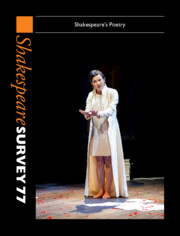Book contents
- Shakespeare Survey
- Shakespeare Survey
- Shakespeare Survey
- Copyright page
- Editor’s Note
- Contributors
- Contents
- Illustrations
- Remembering shakespeare’s Sonnets in Lucy Negro, Redux
- The Poetics of Antiquarian Accumulation in a Lover’s Complaint
- Different Samenesses
- Shakespeare’s Canvas
- ‘Persuasion by Similitude’: Finding Likeness in Shakespeare’s a Lover’s Complaint
- ‘Nothing-to-be-glossed-here’: Race in Shakespeare’s Sonnets
- Allegorical Desire, or, the Sufi ‘Phoenix and the Turtle’
- The Poetics of Shakespearian Erasure: Lyric Thinking with Bhanu Kapil and Preti Taneja
- Lucrece, Letters and the Moment of Lipsius
- Shakespeare’s Arabic Sonnets
- How to make a Formal Complaint: Sara Ahmed’s Complaint! and William Shakespeare’s a Lover’s Complaint
- They also Serve who only Stand and Write, or, how Milton Read Shakespeare’s Sonnets
- Writing Delight with Beauty’s Pen: Restoring Richard Barnfield’s Lost Credit
- Ocular Power and Female Fascinum in Shakespeare’s Venus And Adonis
- Pretty Creatures: A Lover’s Complaint, the Rape of Lucrece and Early Modern Women’s Complaint Poetry
- Lyric Voices and Cultural Encounters Across Time and Space: The Poetry of William Shakespeare and Faiz Ahmed Faiz (1911–1984)
- The thing itself or the image of that Horror: Fictions, Fascisms and We that are young
- Shakespeare’s Refugees
- Shakespeare as a Source of Dramaturgical Reconstruction
- Shakespeare, Race, Postcoloniality: The State of the Fields
- Asian Shakespeares online from Singapore
- Strange Shadows: Translating Shakespeare – The State of the Field
- Gender and Sexuality: The State of the Fields
- Shakespeare Performances in England, 2022–2023
- Productions Outside London, 2022–2023
- Professional Shakespeare Productions in the UK, January–December 2022
- The Year’s Contribution to Shakespeare Studies
- 1. Critical Studies
- 2. Editions and Textual Studies
- Abstracts of Articles in Shakespeare Survey 77
- Index
- References
1. - Critical Studies
from The Year’s Contribution to Shakespeare Studies
Published online by Cambridge University Press: 07 November 2024
- Shakespeare Survey
- Shakespeare Survey
- Shakespeare Survey
- Copyright page
- Editor’s Note
- Contributors
- Contents
- Illustrations
- Remembering shakespeare’s Sonnets in Lucy Negro, Redux
- The Poetics of Antiquarian Accumulation in a Lover’s Complaint
- Different Samenesses
- Shakespeare’s Canvas
- ‘Persuasion by Similitude’: Finding Likeness in Shakespeare’s a Lover’s Complaint
- ‘Nothing-to-be-glossed-here’: Race in Shakespeare’s Sonnets
- Allegorical Desire, or, the Sufi ‘Phoenix and the Turtle’
- The Poetics of Shakespearian Erasure: Lyric Thinking with Bhanu Kapil and Preti Taneja
- Lucrece, Letters and the Moment of Lipsius
- Shakespeare’s Arabic Sonnets
- How to make a Formal Complaint: Sara Ahmed’s Complaint! and William Shakespeare’s a Lover’s Complaint
- They also Serve who only Stand and Write, or, how Milton Read Shakespeare’s Sonnets
- Writing Delight with Beauty’s Pen: Restoring Richard Barnfield’s Lost Credit
- Ocular Power and Female Fascinum in Shakespeare’s Venus And Adonis
- Pretty Creatures: A Lover’s Complaint, the Rape of Lucrece and Early Modern Women’s Complaint Poetry
- Lyric Voices and Cultural Encounters Across Time and Space: The Poetry of William Shakespeare and Faiz Ahmed Faiz (1911–1984)
- The thing itself or the image of that Horror: Fictions, Fascisms and We that are young
- Shakespeare’s Refugees
- Shakespeare as a Source of Dramaturgical Reconstruction
- Shakespeare, Race, Postcoloniality: The State of the Fields
- Asian Shakespeares online from Singapore
- Strange Shadows: Translating Shakespeare – The State of the Field
- Gender and Sexuality: The State of the Fields
- Shakespeare Performances in England, 2022–2023
- Productions Outside London, 2022–2023
- Professional Shakespeare Productions in the UK, January–December 2022
- The Year’s Contribution to Shakespeare Studies
- 1. Critical Studies
- 2. Editions and Textual Studies
- Abstracts of Articles in Shakespeare Survey 77
- Index
- References
Summary
These are books filled with uncertainty. This theme is explicit and central to Lauren Robertson’s Entertaining Uncertainty in the Early Modern Theater, but uncertainty features throughout 2023’s Shakespeare studies in sometimes surprising ways. Questions of knowing and unknowing, the uncertainty of sound, and the slippery unknowability of identities, categories and physical phenomena present a world of unstable knowledge and fraught attempts to fix sense and meaning upon it. Questioning, deconstructing and rendering deliberately obscure emerge as key critical methods, and much seems productively indeterminate.
To begin with those texts tied more closely to questions of performance, Laura Jayne Wright’s Sound Effects: Hearing the Early Modern Stage considers ‘the shifting and malleable sonic world’ of early modern drama (2). This is a work concerned more with the semantics than the mechanics of sound effects, though audience response is a key preoccupation.
- Type
- Chapter
- Information
- Shakespeare Survey 77Shakespeare's Poetry, pp. 320 - 332Publisher: Cambridge University PressPrint publication year: 2024

